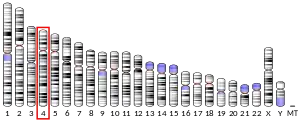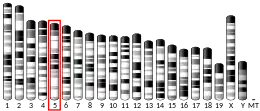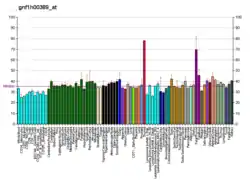Fibroblast growth factor receptor-like 1
Fibroblast growth factor receptor-like 1 is a protein that in humans is encoded by the FGFRL1 gene.[5]
| FGFRL1 | |||||||||||||||||||||||||||||||||||||||||||||||||||
|---|---|---|---|---|---|---|---|---|---|---|---|---|---|---|---|---|---|---|---|---|---|---|---|---|---|---|---|---|---|---|---|---|---|---|---|---|---|---|---|---|---|---|---|---|---|---|---|---|---|---|---|
| Identifiers | |||||||||||||||||||||||||||||||||||||||||||||||||||
| Aliases | FGFRL1, FGFR5, FHFR, fibroblast growth factor receptor-like 1, fibroblast growth factor receptor like 1, FGFR-5 | ||||||||||||||||||||||||||||||||||||||||||||||||||
| External IDs | OMIM: 605830 MGI: 2150920 HomoloGene: 11067 GeneCards: FGFRL1 | ||||||||||||||||||||||||||||||||||||||||||||||||||
| |||||||||||||||||||||||||||||||||||||||||||||||||||
| |||||||||||||||||||||||||||||||||||||||||||||||||||
| |||||||||||||||||||||||||||||||||||||||||||||||||||
| |||||||||||||||||||||||||||||||||||||||||||||||||||
| Wikidata | |||||||||||||||||||||||||||||||||||||||||||||||||||
| |||||||||||||||||||||||||||||||||||||||||||||||||||
The protein encoded by this gene is a member of the fibroblast growth factor receptor (FGFR) family, where amino acid sequence is highly conserved between members and throughout evolution. FGFR family members differ from one another in their ligand affinities and tissue distribution. A full-length representative protein would consist of an extracellular region, composed of three immunoglobulin-like domains, a single hydrophobic membrane-spanning segment and a cytoplasmic tyrosine kinase domain. The extracellular portion of the protein interacts with fibroblast growth factors, setting in motion a cascade of downstream signals, ultimately influencing mitogenesis and differentiation. A marked difference between this gene product and the other family members is its lack of a cytoplasmic tyrosine kinase domain. The result is a transmembrane receptor that could interact with other family members and potentially inhibit signaling. Multiple alternatively spliced transcript variants encoding the same isoform have been found for this gene.[5]
Transgenic mice expressing the giraffe ortholog of FGFRL1 are resistant against hypertension induced by angiotensin II.[6]
References
- GRCh38: Ensembl release 89: ENSG00000127418 - Ensembl, May 2017
- GRCm38: Ensembl release 89: ENSMUSG00000008090 - Ensembl, May 2017
- "Human PubMed Reference:". National Center for Biotechnology Information, U.S. National Library of Medicine.
- "Mouse PubMed Reference:". National Center for Biotechnology Information, U.S. National Library of Medicine.
- "Entrez Gene: FGFRL1 fibroblast growth factor receptor-like 1".
- Liu C, Gao J, Cui X, Li Z, Chen L, Yuan Y, et al. (March 2021). "A towering genome: Experimentally validated adaptations to high blood pressure and extreme stature in the giraffe". Science Advances. 7 (12). doi:10.1126/sciadv.abe9459. PMC 7968835. PMID 33731352.
Further reading
- Maruyama K, Sugano S (January 1994). "Oligo-capping: a simple method to replace the cap structure of eukaryotic mRNAs with oligoribonucleotides". Gene. 138 (1–2): 171–174. doi:10.1016/0378-1119(94)90802-8. PMID 8125298.
- Suzuki Y, Yoshitomo-Nakagawa K, Maruyama K, Suyama A, Sugano S (October 1997). "Construction and characterization of a full length-enriched and a 5'-end-enriched cDNA library". Gene. 200 (1–2): 149–156. doi:10.1016/S0378-1119(97)00411-3. PMID 9373149.
- Wiedemann M, Trueb B (October 2000). "Characterization of a novel protein (FGFRL1) from human cartilage related to FGF receptors". Genomics. 69 (2): 275–279. doi:10.1006/geno.2000.6332. PMID 11031111.
- Kim I, Moon S, Yu K, Kim U, Koh GY (March 2001). "A novel fibroblast growth factor receptor-5 preferentially expressed in the pancreas(1)". Biochimica et Biophysica Acta. 1518 (1–2): 152–156. doi:10.1016/s0167-4781(00)00282-7. PMID 11267671.
- Sleeman M, Fraser J, McDonald M, Yuan S, White D, Grandison P, et al. (June 2001). "Identification of a new fibroblast growth factor receptor, FGFR5". Gene. 271 (2): 171–182. doi:10.1016/S0378-1119(01)00518-2. PMID 11418238.
- Trueb B, Zhuang L, Taeschler S, Wiedemann M (September 2003). "Characterization of FGFRL1, a novel fibroblast growth factor (FGF) receptor preferentially expressed in skeletal tissues". The Journal of Biological Chemistry. 278 (36): 33857–33865. doi:10.1074/jbc.M300281200. PMID 12813049.
- Clark HF, Gurney AL, Abaya E, Baker K, Baldwin D, Brush J, et al. (October 2003). "The secreted protein discovery initiative (SPDI), a large-scale effort to identify novel human secreted and transmembrane proteins: a bioinformatics assessment". Genome Research. 13 (10): 2265–2270. doi:10.1101/gr.1293003. PMC 403697. PMID 12975309.
- Zhang Z, Henzel WJ (October 2004). "Signal peptide prediction based on analysis of experimentally verified cleavage sites". Protein Science. 13 (10): 2819–2824. doi:10.1110/ps.04682504. PMC 2286551. PMID 15340161.
- Antoine M, Wirz W, Tag CG, Mavituna M, Emans N, Korff T, et al. (June 2005). "Expression pattern of fibroblast growth factors (FGFs), their receptors and antagonists in primary endothelial cells and vascular smooth muscle cells". Growth Factors. 23 (2): 87–95. doi:10.1080/08977190500096004. PMID 16019430. S2CID 27380246.
- Schild C, Trueb B (December 2005). "Aberrant expression of FGFRL1, a novel FGF receptor, in ovarian tumors". International Journal of Molecular Medicine. 16 (6): 1169–1173. doi:10.3892/ijmm.16.6.1169. PMID 16273302.




